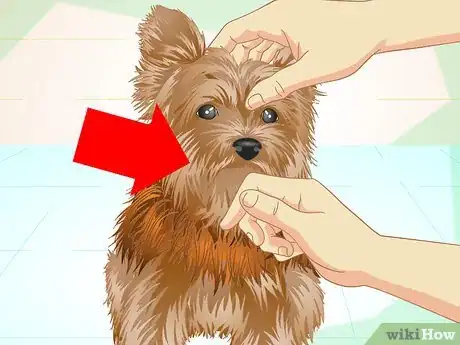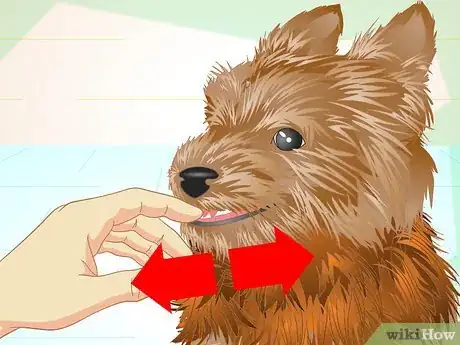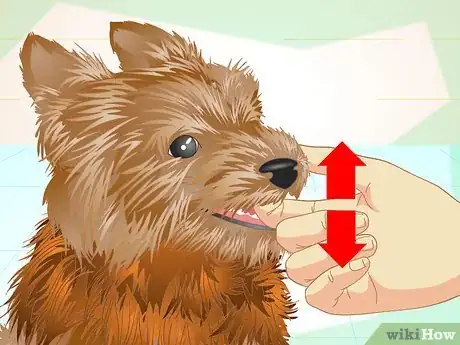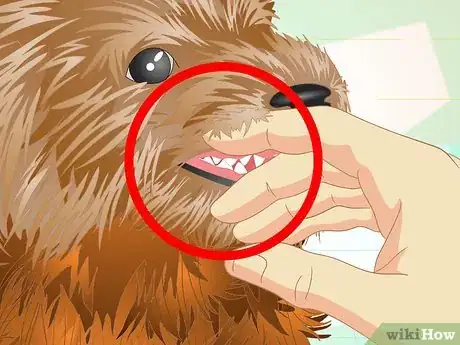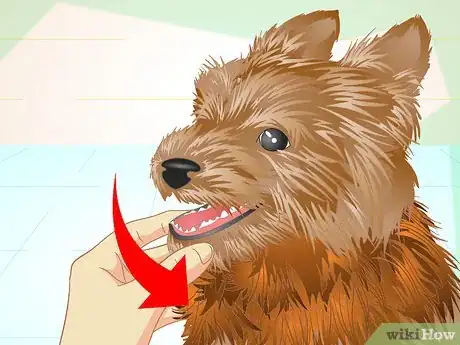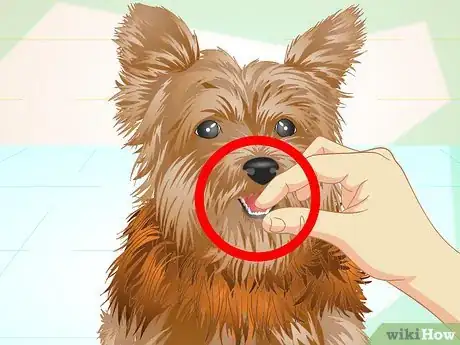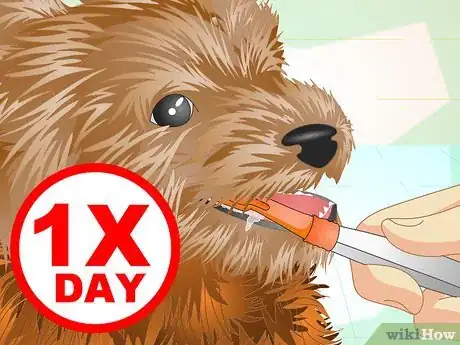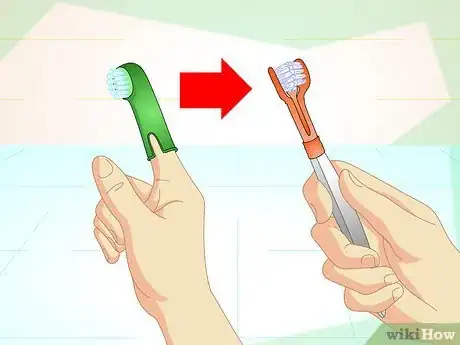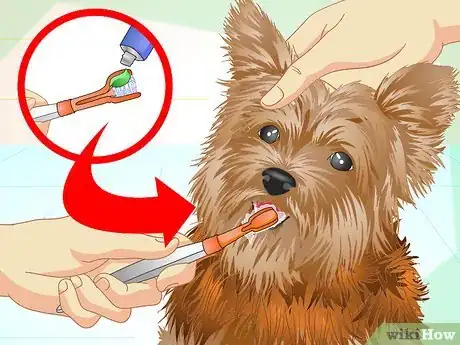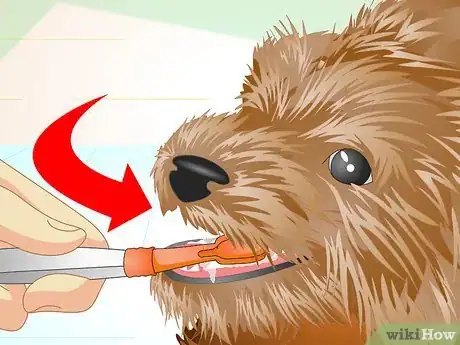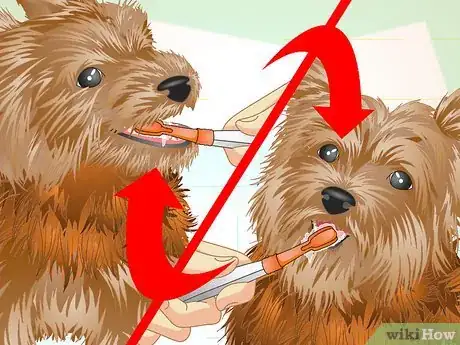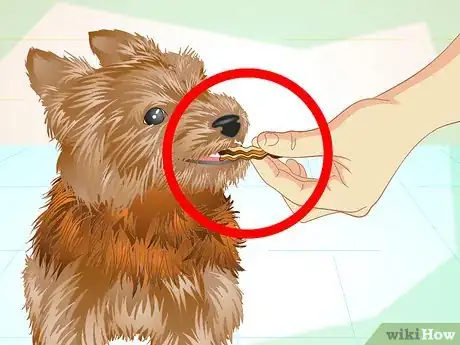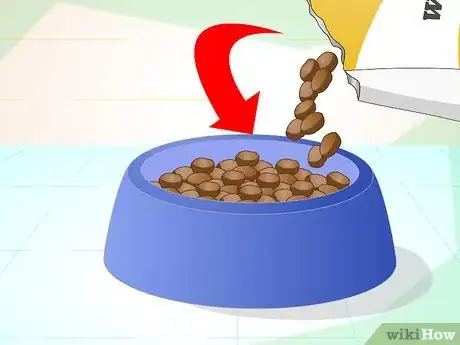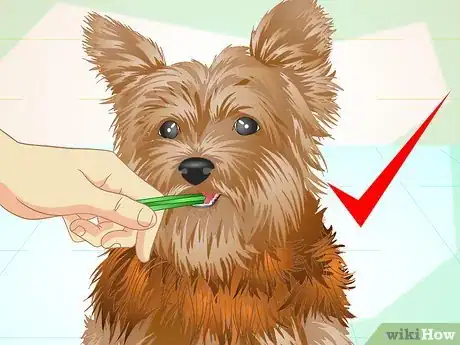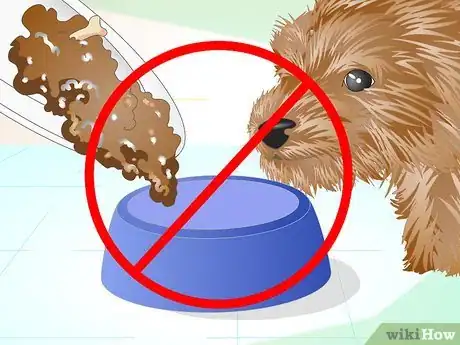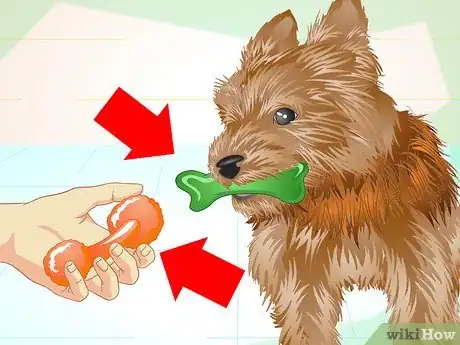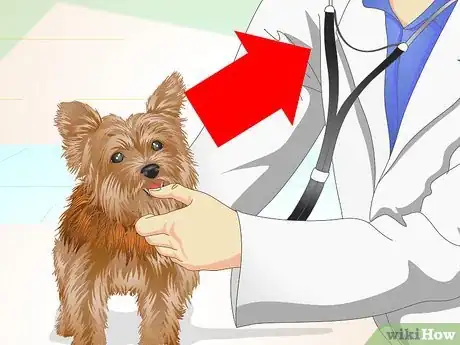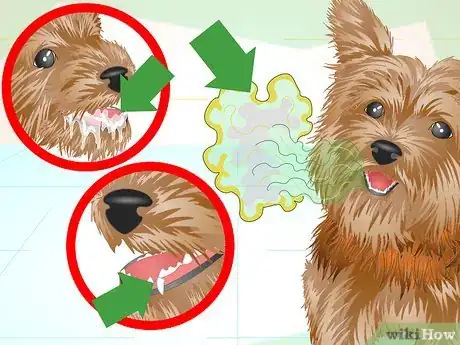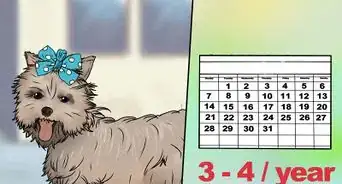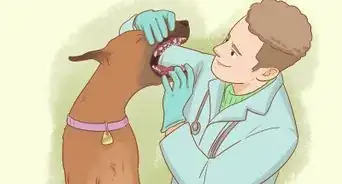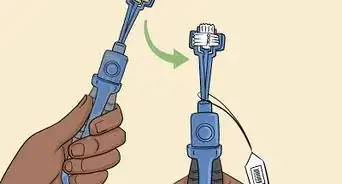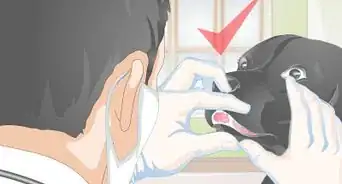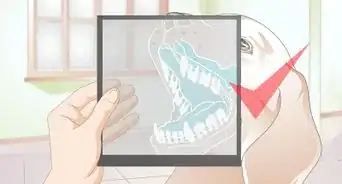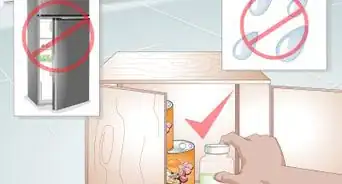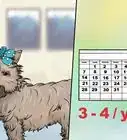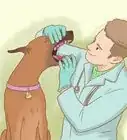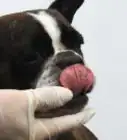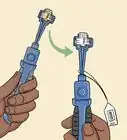This article was co-authored by Jennifer Schneider. Jennifer Schneider is a Dog Behavior and Training Expert, as well as the Owner of Pick of the Litter Dog Training. With over 25 years of experience, she specializes in positive, dog-friendly training. She holds a BA in Psychology with an Emphasis on Animal Behavior from the University of Washington, and she’s a Certified Professional Dog Trainer (CPDT).
wikiHow marks an article as reader-approved once it receives enough positive feedback. In this case, several readers have written to tell us that this article was helpful to them, earning it our reader-approved status.
This article has been viewed 104,294 times.
Yorkshire terriers (or Yorkies) are one of the most popular small-sized dog breeds. They are famous for their loyalty, bravery and adventurous nature. Unfortunately, Yorkies are prone to dental diseases because of the anatomy of their teeth and jaw. Their teeth tend to be compressed and overcrowded in a narrow jaw, making them more susceptible to plaque build up, tooth decay and gum disease.[1] To keep your Yorkie’s teeth clean, you’ll need to train her to accept brushing, brush her teeth regularly, and feed her food and treats that help to maintain healthy teeth.
Steps
Preparing Your Yorkie to Have Her Teeth Brushed
-
1Spend several weeks to get your Yorkie accustomed to having you manipulate her mouth. The key to successfully brushing your Yorkie’s teeth is to take it in stages. Start slowly, using only your fingers at first.[2]EXPERT TIPDr. Elliott, BVMS, MRCVS is a veterinarian with over 30 years of experience in veterinary surgery and companion animal practice. She graduated from the University of Glasgow in 1987 with a degree in veterinary medicine and surgery. She has worked at the same animal clinic in her hometown for over 20 years.Veterinarian

 Pippa Elliott, MRCVS
Pippa Elliott, MRCVS
VeterinarianPippa Elliott, a licensed veterinarian, advises: "Teeth cleaning is so important that you should start getting your puppy used to having their mouth handled right from day one. You will reap the benefits when they are five or six years old and don't need an anesthetic to descale smelly teeth."
-
2Start by rubbing your Yorkie’s teeth and gums with your fingers. This stage should take 2-3 days. The key is to mimic what will happen when you brush your dog’s teeth. Lift her lips to make sure you get at all of her teeth.[3]
- Dip your finger in something your dog likes. Chicken broth, peanut butter, and marinara sauce tend to be popular.
- Rub your finger along your Yorkie’s teeth and gums while she licks your fingers.
- After the first day, start occasionally dipping your finger in your dog’s toothpaste. Some popular flavors include poultry, beef, and liver. Make sure she likes it. If she has no interest in licking it, then you might want to try another flavor.
- You should never use human toothpaste to brush your Yorkie's teeth. Human toothpaste contains fluoride which is toxic to dogs.[4]
Advertisement -
3Practice opening your dog’s mouth. To effectively clean your Yorkie’s teeth, you’ll need to be able to open her mouth and work inside it without her squirming or biting you. This takes practice. And delicious treats. You want her to have positive associations with mouth manipulation, so be sure to have a treat she likes on hand, like cheese or hot dogs.[5]
- If your dog squirms, jerks her head, or tries to escape during the following exercises, gently but firmly hold her muzzle until she stops. When she does, wait a second and release her muzzle.
- Her struggling may be a sign you are moving to fast. Go back to the previous step for a few days.
-
4Begin by simply lifting up your dog’s lips to expose her teeth. The key here is to move slowly. You’ll be brushing your Yorkie’s teeth for years. Don’t worry about taking 3 to 5 weeks to get it right at the start.
- Put one hand under your dog’s chin and the other on top of her muzzle as if you were about to open her mouth. Instead, release her and give a special treat. Repeat 8-10 times per session, a couple of times a day, for 2-3 days.
- With your hands in the same position, this time lift your Yorkie’s upper lips for 2 seconds to expose her teeth. Release, praise, and treat. Do this 8-10 times per session, three or more times a day, for 2-3 days.
- Gradually extend the time you lift your Yorkie’s lips. Over a week, move from 3 seconds, to 5 the next day, then 8, and so forth. When you can hold your dog’s lips up for 10 seconds, move to the next step.
-
5Move on to opening your Yorkie’s mouth. Again, move slowly, starting by opening your dog’s mouth just a little, then opening it wider and longer on successive days.[6]
- With your hands under your dog’s bottom jaw and over the top of her muzzle, open your dog’s mouth about an inch, touch your finger inside her mouth, release, and treat. Repeat 8-10 times.
- Practice this 3 times a day for 1-2 days. In successive sessions, practice open your dog’s mouth a little wider each time until you can see your dog’s back teeth.
- Warning: Do not open your dog’s mouth too wide, as this can cause pain.
-
6Increase the amount of time you can hold your Yorkie’s mouth open and keep your finger along her teeth and gums. Practice 8-10 times per session, with three sessions a day, for 5-7 days. Try to add a second each session, but don’t push it. If your dog struggles, go back to a step she is comfortable with.[7]
- When you can hold your Yorkie’s mouth open for 10 seconds, you are ready to start brushing.
Brushing Your Yorkie's Teeth
-
1Brush your Yorkie’s teeth once a day. Regularly brushing your Yorkie’s teeth is the most important and effective way to keep her teeth clean and minimize the chance of gum disease. It also helps to keep her breath fresh and prevent plaque from developing into tartar. Aim to brush your dog’s teeth once a day, and definitely brush them at least twice a week.[8]
-
2Choose the right toothbrush. When first starting, a finger toothbrush is generally better accepted by Yorkies. After a week or so with the finger brush, you should switch to a three-sided, small breed toothbrush.[9]
- There are certain doggy toothbrushes specially designed for small breeds. Some even have adjustable handles that allow you to reach awkward places more easily. These are available at good pet supply stores.
- You can use dental wipes if your dog has a hard time with a toothbrush. You can purchase disposable wipes at your local pet store.
- Do not use a human toothbrush for your Yorkie’s teeth. Human toothbrushes are too hard and will irritate your dog's gums.
-
3Slowly introduce the toothbrush and toothpaste to your dog. Place a small amount of toothpaste on the doggy toothbrush. Then place one hand over the top of your Yorkie’s muzzle to lift her lips. Using your other hand, gently brush the outer surfaces of a few teeth with a circular motion. Stop after 2-3 seconds and reward with a treat.[10]
- Do this 2-3 times a day for 1-2 weeks. Slowly increase the time you spend brushing: 3 seconds, then 5, 8, 10, and so on.
- Keep increasing the time until you can brush the outer surfaces of all your Yorkie’s teeth.
-
4Start brushing with your dog’s mouth open. Now that you can brush the outer surfaces of your Yorkie’s teeth, it’s time to tackle the inner parts. That means opening your dog’s mouth. Place one hand over your Yorkie’s muzzle and gently open her mouth, as you have practiced. Brush just a few teeth for 2-3 seconds, release, praise, and treat. Repeat this 3-5 times per session.[11]
- Practice twice a day for 3-5 days, gradually increasing the amount of time you keep your dog’s mouth open to 5 seconds.
- Also increase the number of times you clean per session until you can clean the inner surfaces of all your dog’s teeth in one session.
-
5Alternate cleaning your dog’s inner and outer teeth surfaces. Brush daily in short sessions of 5 minutes. Do the outer teeth one day and the inner the next.
-
6Reward your Yorkie after brushing. Play with her or give her a treat to make sure she continues to look forward to tooth brushing.[12]
Maintaining Good Oral Hygiene
-
1Feed your dog hard rather than soft foods. Feeding your Yorkie hard kibble instead of canned dog food can significantly reduce the formation of tartar and plaque on your dog teeth.[13]
- All dry kibble is preferable to wet foot, but consult the Veterinary Oral Health Council website for types of dry food that are specifically designed to reduce plaque and tartar.
-
2Give your dog teeth-cleaning treats. The Veterinary Oral Health Council website lists a variety of treats that can help to remove tartar and plaque from your Yorkie’s teeth.
-
3Do not feed your Yorkie table scraps. Human food, which is often high in sugar, is particularly bad for your dog’s teeth.
-
4Provide your dog with some chew toys. Chewing on toys such as rawhide, pigs ears, bones, and Nylabones helps to reduce the plaque on your Yorkie’s teeth, while also keeping her entertained.[14]
- Please keep in mind that you'll need to monitor your pet carefully when they are playing with a new toy, to prevent accidental choking.
-
5Bring your Yorkie to a veterinary dentist once a year. It is recommended that you bring your Yorkie for a dental check up at least once a year with a professional veterinary dentist. The vet will scrape away any tartar that your brushing has not removed. If you wish to learn how to scrape your dog’s teeth yourself, ask your vet to demonstrate.
-
6Know the signs of dental problems. If your Yorkie has developed tooth decay, periodontal disease, or another serious dental issue, you’ll want to take her to the vet as soon as possible. Watch for:
- Loose teeth
- Bad breath
- Excessive drooling
- Inflamed gums
- Bleeding gums
- Loss of appetite
- Tumors in the gums
- Cysts under the tongue
Expert Interview
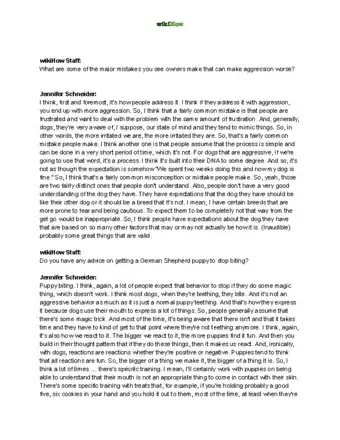
Thanks for reading our article! If you'd like to learn more about brushing a dog's teeth, check out our in-depth interview with Jennifer Schneider.
References
- ↑ http://www.yorkieinfocenter.com/yorkie-teeth-dental-care
- ↑ https://www.aspca.org/pet-care/virtual-pet-behaviorist/dog-behavior/brushing-your-dogs-teeth
- ↑ https://www.aspca.org/pet-care/virtual-pet-behaviorist/dog-behavior/brushing-your-dogs-teeth
- ↑ http://www.yorkieinfocenter.com/yorkie-teeth-dental-care
- ↑ https://www.aspca.org/pet-care/virtual-pet-behaviorist/dog-behavior/brushing-your-dogs-teeth
- ↑ https://www.aspca.org/pet-care/virtual-pet-behaviorist/dog-behavior/brushing-your-dogs-teeth
- ↑ https://www.aspca.org/pet-care/virtual-pet-behaviorist/dog-behavior/brushing-your-dogs-teeth
- ↑ http://www.yorkieinfocenter.com/yorkie-teeth-dental-care
- ↑ http://www.yorkieinfocenter.com/yorkie-teeth-dental-care
- ↑ https://www.aspca.org/pet-care/virtual-pet-behaviorist/dog-behavior/brushing-your-dogs-teeth
- ↑ https://www.aspca.org/pet-care/virtual-pet-behaviorist/dog-behavior/brushing-your-dogs-teeth
- ↑ https://www.aspca.org/pet-care/virtual-pet-behaviorist/dog-behavior/brushing-your-dogs-teeth
- ↑ https://www.aspca.org/pet-care/virtual-pet-behaviorist/dog-behavior/brushing-your-dogs-teeth
- ↑ https://www.aspca.org/pet-care/virtual-pet-behaviorist/dog-behavior/brushing-your-dogs-teeth
About This Article
To keep your Yorkie’s teeth clean, feed it dry kibble instead of canned food, which can help reduce the buildup of plaque and tartar on its teeth. Additionally, give your dog chew toys, like rawhide, pigs ears, and Nylabones, to reduce the plaque on its teeth while keeping it entertained. You should also brush its teeth once a day using a dog-safe toothpaste and a toothbrush made specially for small breeds. If your dog has a hard time with the toothbrush, try using a rubber finger brush or disposal dental wipes, instead. For more advice from our Veterinary co-author, like how to spot the signs of canine dental disease, keep reading!
